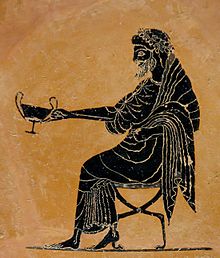Dionysus
| Dionysus | |
|---|---|
God of the vine, grape-harvest, wine-making, wine, fertility, ritual madness, religious ecstasy, theatre | |
| Member of the Twelve Olympians | |
 Second-century Roman statue of Dionysus, after a Hellenistic model (ex-coll. Cardinal Richelieu, Louvre)[1] | |
| Symbol | Thyrsus, grapevine, bull, panther, ivy, goat, masks, chalice |
| Personal information | |
| Parents | Zeus and Semele, Zeus and Demeter (some sources), Zeus and Persephone (Orphic), Ammon and Amaltheia |
| Siblings | Aeacus, Angelos, Apollo, Ares, Artemis, Athena, Eileithyia, Enyo, Eris, Ersa, Hebe, Helen of Troy, Hephaestus, Heracles, Hermes, Minos, Pandia, Persephone, Perseus, Rhadamanthus, Tantalus, the Graces, the Horae, the Litae, the Muses, the Moirai |
| Consort | Ariadne |
| Children | Priapus, Hymen, Thoas, Staphylus, Oenopion, Comus, Phthonus, the Graces, Deianira |
| Equivalents | |
| Greek equivalent | Iacchus, Zagreus |
| Roman equivalent | Bacchus, Liber |
| Etruscan equivalent | Fufluns |
| Egyptian equivalent | Osiris |
Dionysus (/daɪ.əˈnaɪsəs/; Greek: Διόνυσος) is the god of the grape-harvest, winemaking and wine, of fertility, orchards and fruit, vegetation, insanity, ritual madness, religious ecstasy, festivity and theatre in ancient Greek religion and myth.[2][3][4]
He is also known as Bacchus (/ˈbækəs/ or /ˈbɑːkəs/; Greek: Βάκχος, Bákkhos), the name adopted by the Romans;[5] the frenzy he induces is bakkheia. Another name used by the Romans is Liber meaning "free", due to his association with wine and the Bacchanalia and other rites, and the freedom associated with it. His thyrsus, sometimes wound with ivy and dripping with honey, is both a beneficent wand and a weapon used to destroy those who oppose his cult and the freedoms he represents. As Eleutherios ("the liberator"), his wine, music and ecstatic dance free his followers from self-conscious fear and care, and subvert the oppressive restraints of the powerful. Those who partake of his mysteries are believed to become possessed and empowered by the god himself.[6]
In his religion, identical with or closely related to Orphism, Dionysus was believed to have been born from the union of Zeus and Persephone, and to have himself represented a chthonic or underworld aspect of Zeus. Many believed that he had been born twice, having been killed and reborn as the son of Zeus and the mortal Semele. In the Eleusinian Mysteries he was identified with Iacchus, the son (or, alternately, husband) of Demeter.
His origins are uncertain, and his cults took many forms; some are described by ancient sources as Thracian, others as Greek.[7][8][9] Though most accounts say he was born in Thrace, traveled abroad, and arrived in Greece as a foreigner, evidence from the Mycenaean period of Greek history shows that he is one of Greece's oldest attested gods. His attribute of "foreignness" as an arriving outsider-god may be inherent and essential to his cults, as he is a god of epiphany, sometimes called "the god that comes".[10]
Wine played an important role in Greek culture, and the cult of Dionysus was the main religious focus surrounding its consumption.[11] Wine, as well as the vines and grapes that produce it, were seen as not only a gift of the god, but a symbolic incarnation of him on earth.[12] However, rather than being a god of drunkenness, as he was often stereotyped in the post-Classical era, the religion of Dionysus centered on the correct consumption of wine, which could ease suffering and bring joy, as well as inspire divine madness distinct from drunkenness.[13] Performance art and drama were also central to his religion, and its festivals were the initial driving force behind the development of theatre.[14] The cult of Dionysus is also a "cult of the souls"; his maenads feed the dead through blood-offerings, and he acts as a divine communicant between the living and the dead.[15] He is sometimes categorised as a dying-and-rising god.[16]
Dionysus is an agriculture and vegetation deity. His connection to wine, grape-harvest, orchards,[17] and vegetation displays his role as a nature god. As the god of viticulture and grapes, he is connected to the growth and harvest of the fruit. In myth, he teaches the art of growing and cultivating the plant.[18][19][20][21][4]
Name[]
Etymology[]

The dio- prefix in Ancient Greek Διόνυσος (Diṓnusos; /di.ó.nyː.sos/) has been associated since antiquity with Zeus (genitive Dios), and the variants of the name seem to point to an original *Dios-nysos.[22] The earliest attestation is the Mycenaean Greek dative form
